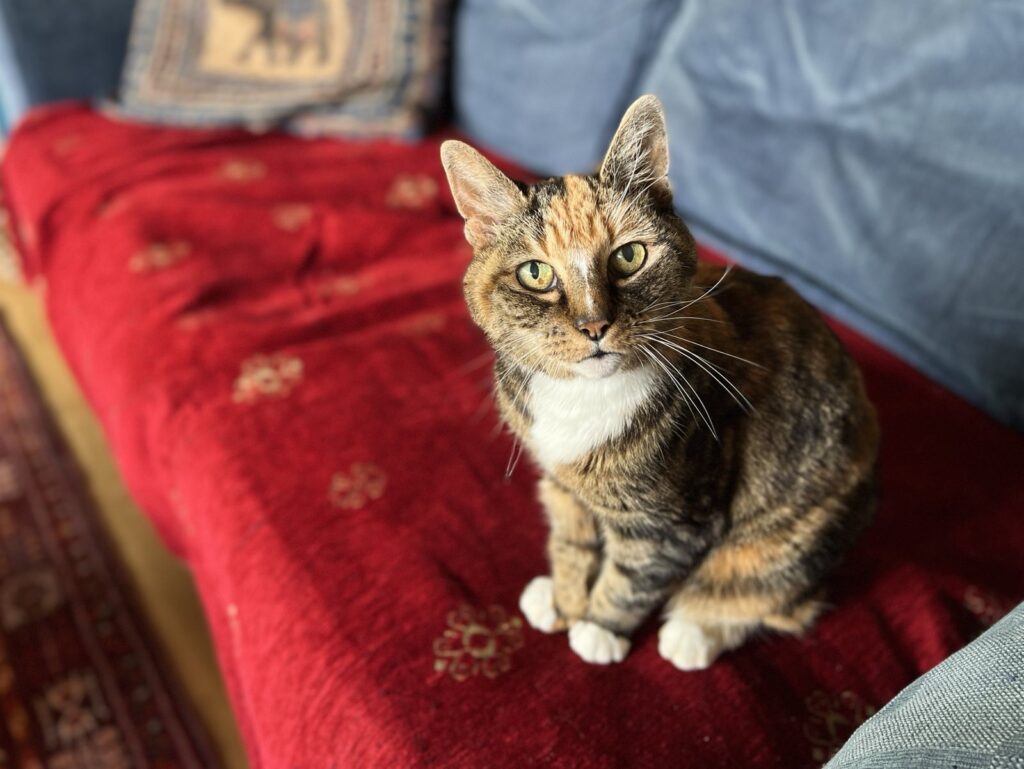So who exactly do you think you are?
Our imperious cat, Tilly, in typically incredulous mood, photographed by one of her two domestic retainers.
Quote of the Day
Has anyone seen a dramatic critic in the daytime? Of course not. They come out after dark, up to no good.”
- P.G. Wodehouse
Musical alternative to the morning’s radio news
Fleetwood Mac | Never Going Back Again
Long Read of the Day
The Art of Dying
Peter Schjeldahl, the Art critic of the New Yorker has died from lung cancer at the age of 80. He had been given the terminal diagnosis in August 2019 and had undergone unexpectedly successful immunotherapy but never recovered entirely. In December 2019, the New Yorker published this unforgettable essay of his on the prospect of dying.
It’s a kind of unanticipated Apologia pro vita sua. Many years ago, he got a Guggenheim award to enable him to write a memoir. He spent most of the money buying a tractor for the farm he had bought in Delaware County, New York State. So, in a way, this essay is a kind of ruminative substitute for what the Guggenheim Foundation expected him to do..
The essay is long but memorable, IMO. I always liked Schjeldahl’s writing, even when I wasn’t interested in many of the exhibitions and works that he scrutinised. What I learned from his Apologia was that he had a pretty eventful life, scarred by alcoholism and other misadventures. It never showed in his writing, though, or if it did I was too dense to spot it.
He’s very good on the advantages of being an ‘unknown’ in competitive fields.
My uptown feats didn’t impress people whom I looked up to in the downtown art scene, where anti-bourgeois hardheadedness and minimalist disdain for the “literary” reigned. They were contemptuous of the Times. I was Peter the poet, a relative nobody. Advice to aspiring youth: in New York, the years that you spend as a nobody are painful but golden, because no one bothers to lie to you. The moment you’re a somebody, you have heard your last truth. Everyone will try to spin you—as they should, with careers to think of. For about a dozen years, I hung out, drank, and slept with artists who didn’t take me seriously. I observed, heard, overheard, and absorbed a great deal.
One drunken night, a superb painter let me take a brush to a canvas that she said she was abandoning. I tried to continue a simple black stroke that she had started. The contrast between the controlled pressure of her touch and my flaccid smear shocked me, physically. It was like shaking hands with a small person who flips you across a room…
Hope you enjoy it as much as I did.
The US supreme court case that could bring (some) tech giants to their knees
Yesterday’s Observer column:
Two weeks ago, the US supreme court decided that it would hear Gonzalez v Google, a landmark case that is giving certain social-media moguls sleepless nights for the very good reason that it could blow a large hole in their fabulously lucrative business models. Since this might be good news for democracy, it’s also a reason for the rest of us to sit up and pay attention.
First, some background. In 1996, two US lawmakers, Representative Chris Cox from California and Senator Ron Wyden from Oregon, inserted a clause into the sprawling telecommunications bill that was then on its way through Congress. The clause eventually became section 230 of the Communications Decency Act and read: “No provider or user of an interactive computer service shall be treated as the publisher or speaker of any information provided by another information content provider.”
What those two politicians couldn’t have foreseen was that section 230 would turn into a get-out-of-jail card for some of the most profitable companies on the planet.
Do read the while thing.
On the importance of knowing what to want
The wisest man I’ve ever known was a distinguished lawyer who had won a Victoria Cross as a young officer in the First World War. I got to know him only towards the end of his long life, and treasure that memory. “The hardest thing in life,” he observed to me one day, “is knowing what to want. Most people never figure it out, and so wind up pretending that they wanted what they could get.”
This came to mind on Saturday reading Janan Ganesh’s column in the weekend edition of the Financial Times. “Knowing what to want,” said the headline, “is the ultimate life skill.” The peg for the column peg was Ewen McEwen’s latest novel, Lessons, which “is about a man to whom life just happens”.
Reflecting on the contrast between this and his own life-experience, Ganesh observes that
I have liked each of the last 17 years a bit more than the last. It isn’t a noble or profound life but it is fun, tranquil and so far in excess of childhood expectations as to still feel alien. How has it been achieved? I have a useful brain but nothing special. I have had some good luck, but not before I had some bad luck. As for hard work, I am of the Reagan view that while it never killed anyone, why take the chance?
“I have but one superpower,” he goes on: “knowing my own mind. For whatever reason I always had a picture of the life I wanted.”
Me too. Thanks to that wise old lawyer, I figured it out early, and was lucky enough to be able to make it happen.
This Blog is also available as a daily email. If you think that might suit you better, why not subscribe? One email a day, Monday through Friday, delivered to your inbox. It’s free, and you can always unsubscribe if you conclude your inbox is full enough already!

